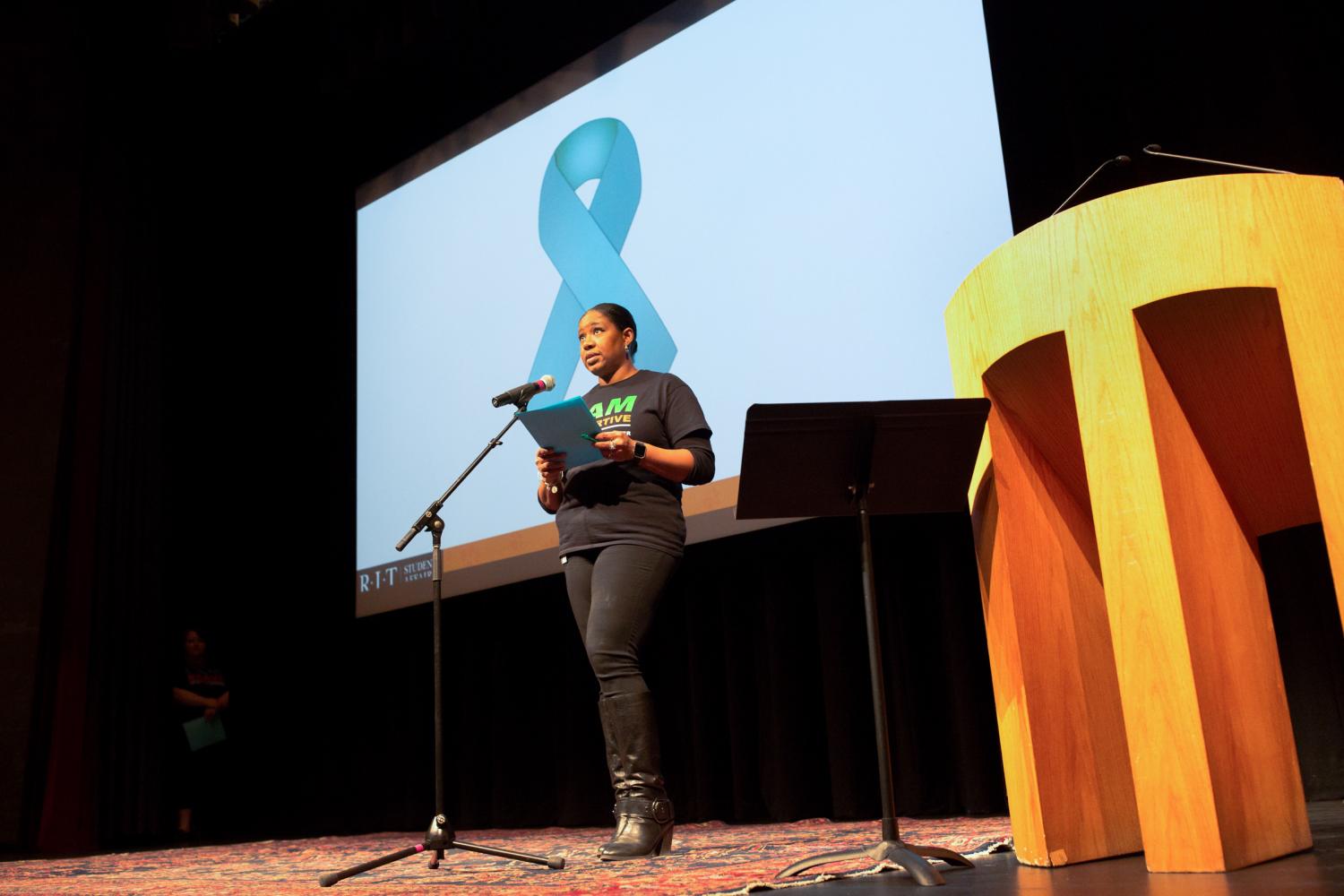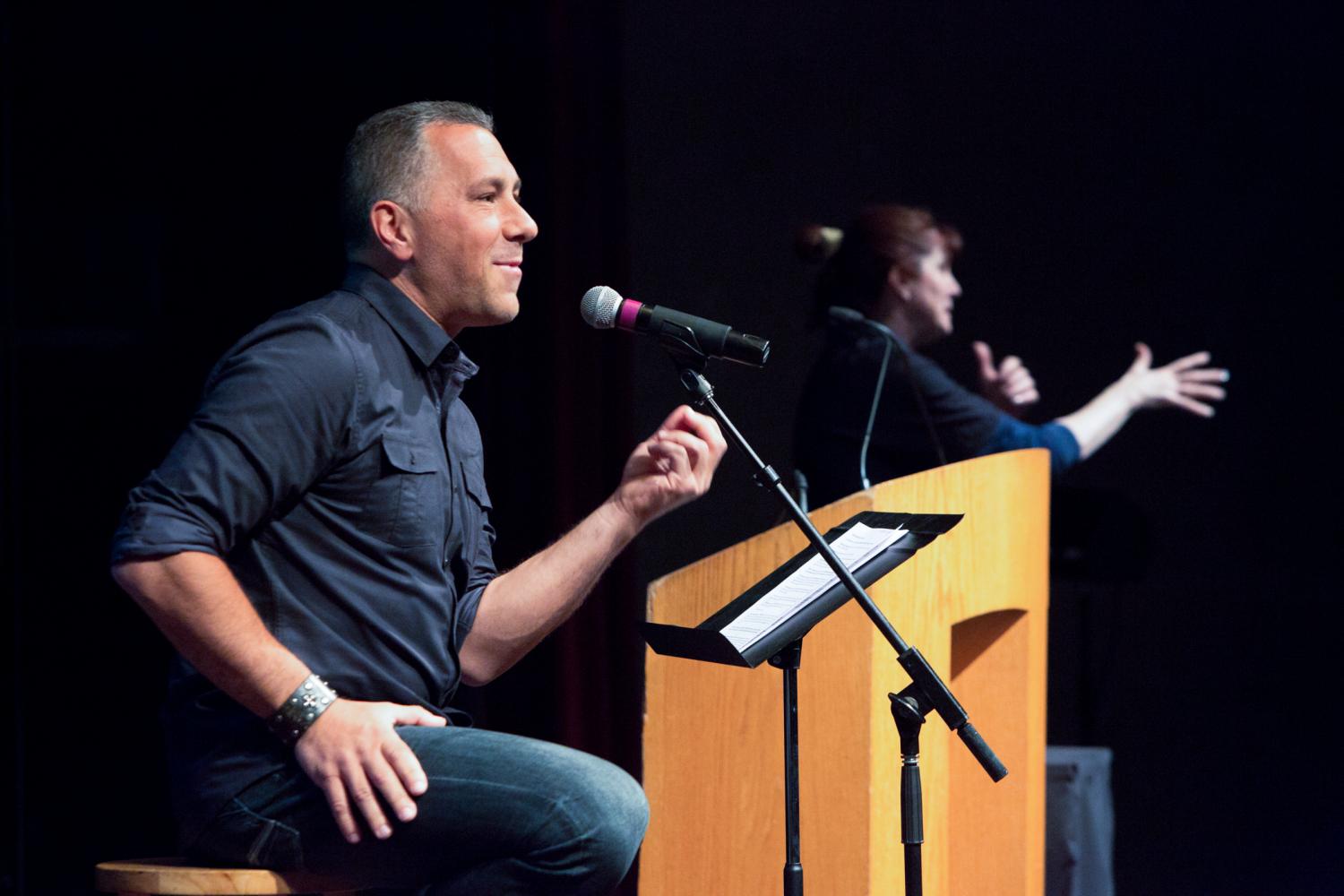“I will tell you that this letter is very difficult to hear at times. It is very graphic, but sexual assault is graphic and I think for too long we haven’t been graphic about it. We have talked about it in ways other than what it is. It’s ugly,” said Center for Women and Gender Director Darci Lane-Williams when she addressed the crowd in Ingle Auditorium on April 17.
The letter she was referring to was no ordinary note. It was the impact statement written by the survivor of the infamous Stanford Rape Case. After a brief introduction, over 20 members of the RIT community stepped forward to the microphone and read portions of her account. For over an hour, the audience sat in complete silence as the survivor’s words filled the space.
Just like Lane-Williams warned, the letter was not easy to hear. Nevertheless, Monday’s talk was intended to engage the RIT community in an honest discussion about sexual assault. The event itself was part of a greater effort by the Center for Women and Gender to promote mindfulness around Sexual Assault Awareness and Prevention Month.
After the letter was read, RIT invited John Pavlovitz to the stage to say a few words. Pavlovitz, a youth pastor with over 20 years of experience and writer of a popular blog, gained notoriety last year for his stirring response to Brock Turner’s father.
Like Lane-Williams, Pavlovitz acknowledged that sexual assault is a difficult topic to contend with. “In 20 years, this is one of the most difficult lessons I’ve had to prepare,” he said. “There is nothing more important than the inherent value of a life, and nothing more tragic when that life is disregarded.”
Despite the gravity of the subject matter, it was Pavlovitz’s hope that the people gathered at the event would depart slightly altered. “If you came in heavy, I want you to leave lighter,” he said. “I want you to see yourself differently, I want you to see this world differently.”
In order to make that change happen, Pavlovitz implored the crowd to recognize their own power for good. “At 20 or 21, I didn’t realize that my words and actions could alter the trajectory of another life. And that’s what you can do,” he said. “That’s the power of tonight. That’s the beauty of tonight, because as sad as these stories are, we can actually do something to rewrite more of those stories.”
That is because at the moment there are too many tragic stories out there, he explained. According to Rape, Abuse & Incest National Hotline, 11.2 percent of all college students, graduate or undergraduate, experience rape or sexual assault through physical force, coercion or incapacitation. For undergraduate women, that number is even higher, at 23.1 percent.
As heartbreaking as those numbers are, Pavlovitz doesn’t believe statistics alone will inspire people to action. “These numbers don’t really mean anything to us, they don’t move us,” he argued. “Numbers and statistics aren’t the reason you came out tonight and sat here, it’s not the reason I came all the way from North Carolina to share the space with you ... we are not numeric percentages.”
Instead, Pavlovitz stressed the importance of listening to those stories, and making sure they are never forgotten. However, he recognized that the media’s constant fixation on the “new” can sometimes make remembrance a challenge.
“When I got contacted by those media outlets, I knew they didn’t care about this issue at all. They cared about the story of the day. They didn’t want to talk to me tomorrow, because by then they would’ve moved on to something else,” Pavlovitz said. “The victim didn’t matter, other victims didn’t matter, other issues of consent didn’t matter. So I knew I had to take the opportunity to leverage that attention best I could, and center it on survivors.”
“I was told over and over, ‘We’re going to get back to this topic at a later time' — and they haven’t, and they won’t,” he continued. “That’s why tonight matters, because the media is not going to care about people. The government is not going to do it. Living, breathing people in this room are going to do it. We are the caretakers of one another’s lives; we are involved in each other’s stories.”
"I want you to pay attention the stories you rub shoulders with. Because they need you to notice."
For his closing remarks, Pavlovitz had some final requests. “Be really good listeners. Dare to ask the follow up question,” he said. “I want you to pay attention to the stories you rub shoulders with, because they need you to notice.”
All Year Round:
As mentioned previously, Pavlovitz’s talk was part of a longer string of events. The Center for Women and Gender, along with various other groups on campus, collectively organized several acts for Sexual Assault Awareness and Prevention Month.
Some of this month’s other offerings included an exhibition at the entrance of the Wallace Library, a Women’s Health Fair in the Fireside Lounge and a Slut Walk planned by Sigma Psi Zeta.
While Sexual Assault Awareness Month only lasts the duration of April, the issue itself never goes away. For that reason, RIT has several policies and programs in place to ensure student safety no matter what season.
Back in 2015, the school designated Associate Director of Public Safety Stacy DeRooy as full-time Title IX director. Ever since then, DeRooy has coordinated with multiple factions of the school to better improve how sexual harassment complaints are handled.
“The Title IX office is responsible for maintaining consistency in our Title IX process,” she explained. “When faculty, staff, community members file a complaint, I oversee the process.”
DeRooy’s role also encompasses community education. “On the faculty-staff side, we talk about how it is their obligation to report something if it was disclosed to them,” she said. “For the students, it’s letting them know what their resources are, what resources are available to them, and to let them know they have options if something were to happen.”
"It's wordy, there's a lot to it — but we want people to feel good about the process. We want them in the drivers seat."
Ultimately, DeRooy finds her objective straightforward. “It’s wordy, there’s a lot to it — but we want people to feel good about the process. We want them to be in the driver’s seat.”
Once again, DeRooy stressed that educating students about available options is the key to helping them gain control of the situation. “We know a lot of times students aren’t quiet ready or are unsure of what they want to do, or what they can do. We want people to know that if they are unsure, a confidential office is probably a great way to start,” she said.
There are six confidential offices on campus, including The Ombuds Office, Student Health, The Counseling Center, Center for Religious Life and NTID’s Academic and Counseling Services. When it comes to sexual assault and harassment, however, DeRooy recommends the planners of the aforementioned event — the Center for Women and Gender.
Lane-Williams, director of the Center for Women and Gender, confirmed this sentiment. “If a student experienced something that they don’t want to report, but they want a place to talk you through, we’re one of 6 confidential reporting locations on campus where a student can walk in and say, ‘I was assaulted last night, and I don’t know what to do,’ and we’re not required to immediately report it,” she said. “It gives them a chance to learn about their options first.”
The Center for Women and Gender also provides counseling for a variety of different topics not just related to Title IX. “We also provide counseling and support for anyone with relationship issues. And the way I explain that is you have relationships with everyone. So it’s not just romantic relationships," said Lane-Williams. "Anyone that you deal with, you have relationships with. How deep that relationship with, what type of relationship it is by the person. But we don’t just help people with romantic relationships.”
The Center's responsibilities extend beyond walk-ins and consultations, however. When crises do occur, they have protocols in place to respond. “When our office is closed, we have a trained team of volunteers who are always on call. That is our CARES [Campus Advocacy, Response and Support] program,” Lane-Williams explained. “When the office is open, one of us goes. It doesn’t matter what we’re doing, if public safety calls and says, ‘There’s a student here that that is reporting violence, stalking,’ whatever it is, we go to them. Immediately.”
A lot of the Center for Women and Gender’s efforts are also directed in stopping those crises from happening the first place. “We offer prevention education — so workshops, outreach programing, different events,” Lane-Williams said.
The challenge with teaching sex education at the college level, Lane-Williams went on to explain, is that students often come in with different levels of understanding about assault, harassment and consent.
“Most of the students that we are seeing that are found responsible for sexual misconduct are not some creepy rapist looking forward to taking advantage of people,” said Lane-Williams. “It’s usually someone ignorant who doesn’t understand what consent means. They don’t know when they have it, when they can’t have it.”
For that very reason, the Center for Women and Gender and the Title IX office strive to remove that metaphorical grey area, and make the rules about consent abundantly clear. According to DeRooy, their efforts appear to be working.
“Our numbers have gone up as far as incidents that have been reported to us,” she said. “That is absolutely a testament to our education programs. We know that we see upticks in reporting after we do a training program because people become familiar with ‘oh, that thing that happened to me last year was reportable.'”
Williams was in agreement. “Creating a culture of reporting is deliberate. It doesn’t happen by accident. You have to want to,” she said. “Just like creating a culture of silence — that is deliberate too.”
“So if we deliberately set out to make reporting easier, to make students feel safely, then we have to take active steps. We have to put policies in place, we have to put procedures in place,” Lane-Williams continued. “If a student goes through our process, whatever the outcome is, we want them to say ‘that process felt good for me'. There are no winners in Title IX cases. It sucks no matter what, but we do want students to feel respected.”
In 2015, 15 cases of rape and 10 cases of dating violence were reported
Lane-Williams agreed that RIT is doing an adequate job. “And that’s coming from a very critical advocate, because I would be very forthcoming if I thought we weren’t doing a good job,” she said.
At the end of the day, sexual assault is challenging to talk about. But as long as sexual assaults occur on campus — or off — the Center for Women and Gender and the Title IX office will strive to have those conversations. “As long as people are being assaulted, we need to continue to figure out why that is happening,” said Lane-Williams.
If you or anyone else you know needs help, or if you are interested in finding out more about the organizations mentioned above, please check out the following links:










